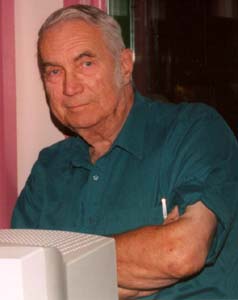
Year Born: 1926
Year Died: 2005
Pioneer – Member of CAB Hall of Fame
Bishop, Willard A. (1926-2005)
Willard Bishop was born in Sydney, Nova Scotia and later moved to Windsor, N. S. His father, a superintendent of the local power company, was a “Ham” operator. This encouraged Willard to take an interest in first, a public address system, and then a local “wired” radio hook-up to several neighbors’ houses during the early part of World War II. CBC picked up the story and did a quarter-hour feature.
In 1944, Willard was asked to do sound effects for “The Gillans”, a CBC dramatic serial of a farm- family aired as a segment of the noon-hour live farm broadcast to the Maritimes. With help from his father and grandmother, he applied for a commercial license (in his fathers name) and CFAB Windsor, N. S., went on the air November 13, 1945. Canadian Press carried the story, referring to Willard as “Canada’s youngest program director at age 19”
A year later CFAB went to 250 watts, and plans were laid to expand coverage to more of the Annapolis Valley. In 1948, a second transmitter, CKEN Kentville, went on the air. Studios were added there in 1949.
In 1951 CKEN went to 1000 watts, but poor ground conductivity prevented coverage of the entire valley. Willard increased farm broadcasts by conducting noon reports and submitting items to the CBC.
In 1962, he put CKAD Middleton on the air with 1000 watts but coverage to the west was still disappointing. In 1963, signal splits permitted each of the three stations to carry local separate commercials or programs. There was no technology available to handle split transmissions so Willard came up with a piece of equipment to solve the problem, the first split system in the world. That year, Willard Bishop was appointed Managing Director of the stations.
CKWM-FM went into service in 1963 with the first regional FM transmitter in the Maritimes. The 900 foot height of the transmitter site allowed VHF communications from studio to studio and live voice feeds from anywhere in the Valley. This transmitter location, halfway between Halifax, Nova Scotia and Saint John, New Brunswick made it possible to create the first FM network in the Maritime Provinces.
In 1967 Willard started working on his pilot’s license, which he received before the year’s end. This meant faster “hands on” communication between his three stations and the first plans for a Digby addition. Before that could happen, a relocation of the Middleton transmitter was required. Previous problems with ground conductivity caused Bishop to study soil maps as well as the usual topographical surveys to find the best location, and it paid off. After months of work the job was accomplished with better than expected results.
Digby was on the air with 1000 watts after a relay from Kentville via a repeater at Spa Springs.
Traffic and accounting were having problems keeping up with commercial splitting of the three stations. A card reader system (the early computer) was installed in 1970 and although slow, the system was an improvement. The first real computer came along in 1973 with Willard going to “school” in Montreal to learn how to use it, and on his return wrote all the programs for its use. He also did custom computer work for other stations, and other firms in order to cover the cost of his own installation.
During all these development years Bishop built almost everything non-electrical, including board room tables and other studio and control room furniture.
Along the way Willard Bishop was President of the Atlantic Association of Broadcasters (1966) and a director of the Canadian Association of Broadcasters (1967 – 68).
In 1975, Willard Bishop’s years of agriculture reporting resulted in an award from the Nova Scotia Department of Agriculture and Marketing.
On June 26th, 1979, the four-station network was sold. Following the sale, Willard Bishop was asked to install traffic and financial computer systems in three major and two rural stations in the Maritimes. He gradually moved to a second career, creating computer systems for municipal governments.
In 1997, he was named Broadcaster of the year by the Atlantic Association of Broadcasters.
A true Pioneer, Willard Bishop was inducted into CAB’s Broadcast Hall of Fame in 1997.
Willard Bishop died at home on Saturday morning, January 15th, 2005 after a lengthy illness. He was 78.
Written by Ross McCreath – October, 1997
